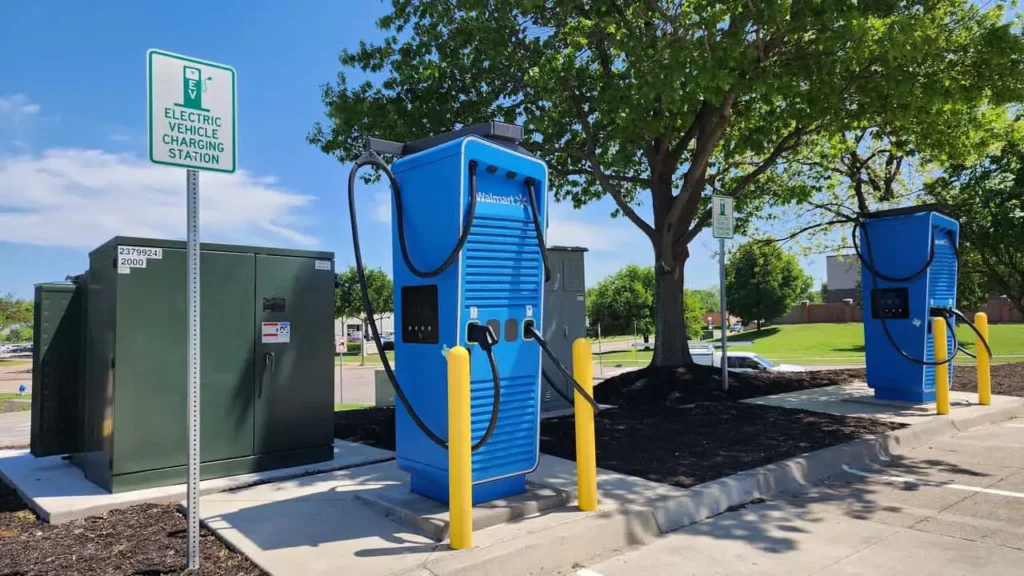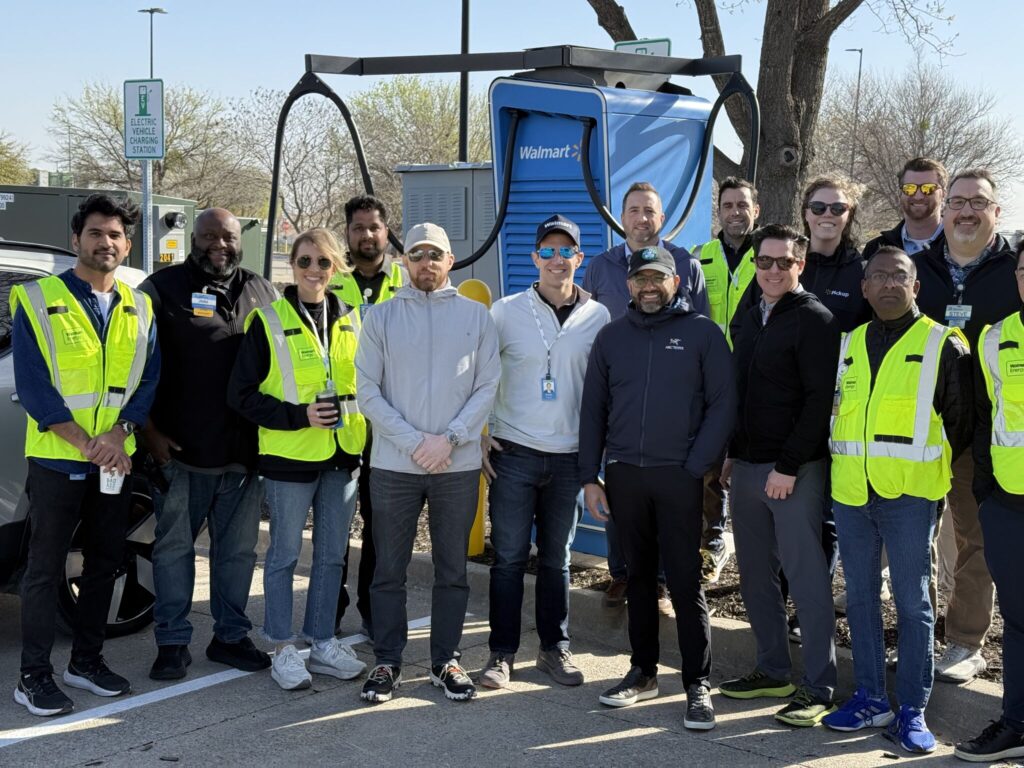Walmart’s Bold Plans for EV Charging
Electric vehicle (EV) sales in the U.S. are charging ahead at a tremendous pace. According to the latest Kelley Blue Book report via parent company Cox Automotive, nearly 300,000 EVs were sold in the first quarter of 2025—an 11.4% increase compared to Q1 of last year. That’s a strong signal that EV adoption continues to gain momentum, even amid the current market uncertainty and geopolitical headwinds.
As America edges toward a cleaner transportation future through mass EV adoption, interest in electric vehicles (EVs) continues to grow. Around a third of Americans say they would consider purchasing an EV if they were in the market for a vehicle today. Yet this momentum is being throttled by a persistent and glaring problem: the lack of accessible EV charging infrastructure.
Charging logistics remain the number one barrier preventing more Americans from making the switch to electric. And among those concerned about charging, the scarcity of public chargers tops the list. But amid the scramble to close this infrastructure gap, one powerful ally is being overlooked: retail stores.
CR Report: Charging the Future—The Role of Retail in Our EV Transition
Consumer Reports released a thought-leading report in March 2024, Charging the Future—The Role of Retail in Our EV Transition, written by Chris Harto and Drew Toher.
The report said that EV chargers not only attract more customers—boosting foot traffic by an average of 4 percent—but also drive a measurable increase in revenue, estimated at around 5 percent after the installation of fast chargers.
Despite these advantages, most major retailers have been slow to act. The investigation by Consumer Reports, which examined 270,000 retail and fast-food locations operated by 75 major companies, found that only about 1 percent offered any EV charging as of March 2024. Even among the retail sectors doing relatively better—like big box stores and grocery chains—the numbers remained dismally low.
In March 2024, EV charging was available at just one out of every 14 big box store locations and one out of every 15 grocery stores. Department stores fared even worse, averaging only one charging site for every 40 locations.
Only one national retailer, Ikea, stood out for its near-universal EV charging availability across U.S. locations. In March 2024, other big box names such as Target and Walmart were reported as trailing behind, with fewer than 10 percent of their stores offering charging services.
Since that Consumer Reports study was released over a year ago, Walmart has taken bold action, beginning to deliver on its promise to install new electric vehicle fast-charging stations.

Walmart Taking Bold Action for EV Charging
In April 2023, Walmart said: “By 2030, we intend to build our own EV fast-charging network at thousands of Walmart and Sam’s Club locations coast-to-coast. This would be in addition to the almost 1,300 EV fast-charging stations we already have available at more than 280 U.S. facilities.”
On April 30, 2025, Charles Morris reported for Charged EV Fleet & Infrastructure News that Walmart has opened up three locations on a pilot basis, with two in Texas and one in Arkansas. The company revealed some more details of its plans in an interview with State Of Charge’s Tom Moloughney.
Walmart is stepping up in a big way when it comes to EV charging—and it’s a move that could reshape how and where Americans power their electric vehicles. With more than 5,200 Walmart and Sam’s Club stores spread across the country, including in rural, suburban, and urban areas, Walmart has something no other company can claim: a near-ubiquitous presence.
In fact, it’s often said that 90% of Americans live within 10 miles of a Walmart or a Sam’s Club. That kind of reach means Walmart’s commitment to EV infrastructure could make charging vastly more accessible, fast-tracking the country’s transition to electric transportation.
It’s true that Walmart already hosts EV chargers at its locations. Through partnerships with companies like Electrify America and EVgo, the retailer has over 1,300 fast chargers as of 2023. But now, the company is going a step further—building its own branded charging network, fully owned and operated by Walmart itself.
While Walmart hasn’t shared specific rollout numbers yet, industry expert Moloughney suggests the company may install a five-digit number of charging stalls by 2030. That kind of scale would put Walmart in the same league as the largest charging networks in the country.
The infrastructure itself promises to be state-of-the-art. At new locations like one in McKinney, Texas, Walmart is deploying 400 kW Alpitronic HYC400 chargers—among the fastest on the market—capable of delivering ultra-rapid charging speeds. Each charger offers two ports, one for the CCS1 standard and one for NACS (SAE J3400), reflecting the evolving connector landscape. While early installations include a 50/50 mix of CCS and NACS, Walmart plans to shift more toward NACS over time.

Charging will be integrated into the Walmart app for a streamlined user experience. Early reports, including Moloughney’s hands-on test, show promise. At the McKinney site, he was able to scan a QR code, select a connector, plug in, and start charging at over 300 kW without any issues. Walmart also plans to add credit card payment support, at least in states where it’s required.
Beyond technology, Walmart’s decision to bring charging in-house reflects a strong belief in the future of EVs—and in the potential for retail-based charging to thrive. The company’s vast parking lots, combined with easy access to food, restrooms, and shopping, create ideal conditions for drivers who need to spend 20–30 minutes topping up their vehicles.
If Walmart’s everyday low pricing philosophy carries over to charging, that would be another major advantage for drivers. In McKinney, the rate was $0.42 per kWh—competitive, and slightly lower than other fast-charging providers in the area.
Leading this bold new push is Adam Happel, a well-known name in the EV space with experience at both EVgo and Rivian. His leadership adds further credibility to Walmart’s ambitions and suggests the company is serious about building a reliable, user-friendly, and affordable charging network. Happel is Walmart’s General Manager, Commercial GTM and Operations for Retail (Public) EV Charging.
Happel said: “America needs more EV charging, especially in locations that are convenient to daily routines. At Walmart we’re building a convenient, reliable, and affordable charging network. We know more and more of our customers are driving electric vehicles, and being able to charge while shopping for groceries, new home electronics, or clothes for the first day of school will save both time and money.”
On April 24, Moloughney wrote for Inside EVs about his exclusive interview with Happel. The company agreed to talk in detail about the Walmart EV charging network plans for the first time. In the article, Moloughney made many important points.
Paramount among those points is the fact that Walmart owns most of the real estate where its stores are located. So, as utilization increases, it can simply add more chargers as needed to accommodate more EV throughput without an issue. No other EV charging network can do that currently, so that means Walmart could be instrumental for dramatically increasing the EV charging footprint all across America.
In short, Walmart’s bold, game-changing move into EV charging is a turning point. It’s not just about adding more plugs—it’s about making fast, convenient, and fairly priced charging available in the everyday places Americans already go. This initiative could help solve one of the EV market’s most persistent pain points and accelerate mass adoption in a way few others can.

Electric Vehicle Marketing Consultant, Writer and Editor. Publisher EVinfo.net.
Services